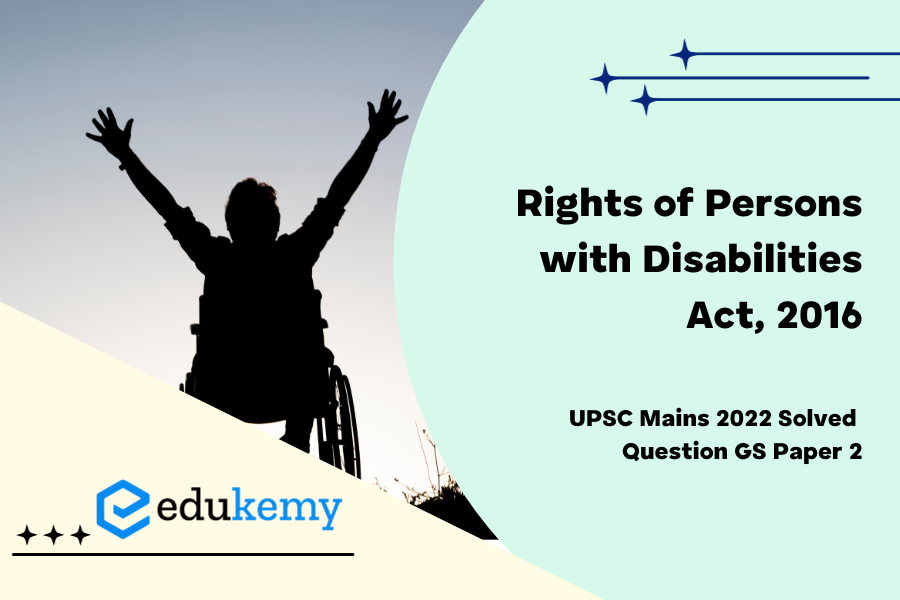The Rights of Persons with Disabilities Act, 2016, though a comprehensive legal framework, requires substantial awareness campaigns to ensure effective implementation. The lack of sensitization among government officials and the general public impedes the realization of its objectives, hindering the empowerment and inclusion of persons with disabilities. Advocacy efforts are crucial for fostering a truly inclusive society.
UPSC Mains General Studies Paper – 2 Mains 2022
UPSC Mains Civil Services IAS Exam Question Paper – 2022
Contents
Approach
- Introducing with the objective, vision and significance of keywords asked in The Rights of Persons with Disabilities Act, 2016.
- Detailing the ideas refers to its remains only as a legal document without intense sensitization from all sections.
- Explain how it can be an important step towards protecting the rights of persons with disabilities in India
- Accordingly, conclude it.
Answer
Introduction
The Rights of Persons with Disabilities Act (RPwD Act) 2016 is a significant step towards protecting the rights of persons with disabilities in India. The act replaced the Persons with Disabilities (Equal Opportunities, Protection of Rights and Full Participation) Act of 1995, and it brought significant changes in the way disability is perceived and addressed in the country.
Body
The Rights of Persons with Disabilities Act in India has introduced several new features to protect the rights of people with disabilities. It has increased the number of recognized disabilities from 7 to 21, with the government having the authority to add more types. The new types of disabilities include conditions such as speech and language disabilities, dwarfism, and muscular dystrophy. The act requires the appropriate governments to take effective measures to ensure that individuals with disabilities enjoy equal rights with others, and it provides additional benefits such as reservation in higher education and government jobs.

Sensitization refers to the process of increasing awareness and understanding of disability issues among government officials and the general public. This is important because many people may not be aware of the challenges and barriers faced by persons with disabilities and may not understand how to support and include them in various activities. Sensitization can be achieved through a range of activities, including training programs, awareness campaigns, and education programs.
The act also requires government-funded and recognized educational institutions to provide inclusive education to children with disabilities, and it stresses the importance of ensuring accessibility in public buildings. The creation of broad-based Central and State Advisory Boards on Disability will serve as apex policy-making bodies at the Central and State level. The Chief Commissioner for Persons with Disabilities and the State Commissioners will act as regulatory bodies and Grievance Redressal agencies and also monitor implementation of the Act.
District level committees will be formed to address local concerns of persons with disabilities, and National and State Funds will be created to provide financial support to those with disabilities. The Bill provides for penalties for offences committed against persons with disabilities and special courts will be designated in each district to handle cases concerning violation of their rights.
Conclusion
The goal of the policy document — of inclusiveness and empowerment — cannot be achieved without political inclusion. The policy can follow a four-pronged approach: building the capacity of disabled people’s organizations and ‘empowering their members through training in the electoral system, government structure, and basic organizational and advocacy skills’; the creation, amendment or removal of legal and regulatory frameworks by lawmakers and election bodies to encourage the political participation of the disabled; inclusion of civil societies to ‘conduct domestic election observation or voter education campaigns’; and a framework for political parties to ‘conduct a meaningful outreach to persons with disabilities when creating election campaign strategies and developing policy positions’.
In case you still have your doubts, contact us on 9811333901.
For UPSC Prelims Resources, Click here
For Daily Updates and Study Material:
Join our Telegram Channel – Edukemy for IAS
- 1. Learn through Videos – here
- 2. Be Exam Ready by Practicing Daily MCQs – here
- 3. Daily Newsletter – Get all your Current Affairs Covered – here
- 4. Mains Answer Writing Practice – here


